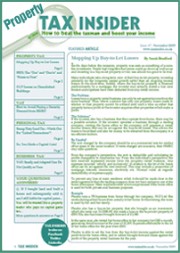Before you go, sign up to our free tax saving email course. Get 7 top property tax saving strategies in your email inbox that will help you save thousands in tax. Unsubscribe any time.
|
If you buy a property and spend money on improvements or even on a complete rebuild, you are likely to be doing so for one of two reasons – either you hope to sell the refurbished property at a profit, or you intend to keep it and derive an income from letting it out. Why does it matter? The distinction is important because in the case of a sole trader or partnership, a profit on the sale of the property will be charged to income tax (at up to 45%) in the case of a property development trade, whereas in the case of a property investor, the sale will attract capital gains tax (at 28%). In the case of a limited company, both income profits and chargeable gains are charged to corporation tax at 20%, but there are still important differences in the accounting and tax treatment. Property developers (who buy and refurbish with a view to sale) are also required to operate the construction industry scheme on payments made to subcontractors, and penalties for failing to do so can be severe, whereas landlords of investment properties are generally not liable for this unless their expenditure on construction operations is very high. From time to time, HMRC will look closely at a property disposal that has been treated as the sale of an investment and that produces a capital gain, to see if it was in fact a trading transaction. Intention is important In theory, it is the intention at the time the property is purchased that will determine the correct tax treatment, but in the real world things are often more complicated. A recent case (Terrace Hill (Berkeley) Ltd v HMRC [2015] UKFTT 75 (TC)) involved a limited company that acquired and refurbished a property, and then sold it shortly after all the offices had been let to tenants. This is a typical property developer’s strategy – the value of a commercial property can be significantly increased by getting good quality tenants established – but the company claimed it had intended to keep the property as an investment and had only sold it when the rental profits proved disappointing and they received a good offer for the property. The distinction was important in this case because the company had bought a tax avoidance scheme from one of the ‘Big Four’ accountants (KPMG), but the scheme only avoided tax on capital gains, not on trading profits. Not surprisingly, HMRC were keen to prove the profit on the building was a trading profit (having previously reluctantly accepted that the avoidance scheme did indeed avoid tax on capital gains). The details of the case are not important, but the significant point is that the First-tier Tribunal accepted the evidence of various directors of the company, all of whom explained that the original intention was to create an investment to produce future income, and that the sale only happened because of disappointing results and a good offer to buy. The tribunal emphasised that they were impressed by the directors’ integrity as well as their knowledge of the property business. Practical Tip: This case illustrates an important principle about the distinction between trading and investing – it is the intention that is the fundamental way to determine what sort of transaction is involved, not the bare facts such as the time between purchase and sale. If you can show you bought the property intending to hold it for its income, the fact that you sold it as a result of getting a good offer shortly afterwards need not convert the transaction into one of trade. This is a sample article from the monthly Property Tax Insider magazine. Go here to get your first free issue of Property Tax Insider.
|


 Tax Articles
Tax Articles
 James Bailey
James Bailey